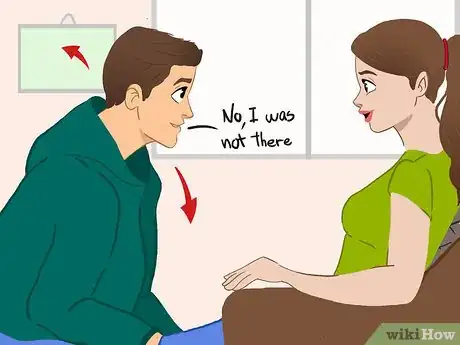This article was co-authored by Tasha Rube, LMSW and by wikiHow staff writer, Christopher M. Osborne, PhD. Tasha Rube is a Licensed Social Worker based in Kansas City, Kansas. Tasha is affiliated with the Dwight D. Eisenhower VA Medical Center in Leavenworth, Kansas. She received her Masters of Social Work (MSW) from the University of Missouri in 2014.
There are 13 references cited in this article, which can be found at the bottom of the page.
This article has been viewed 54,693 times.
Everyone lies sometimes, but very few people are really good at it. So, more often than not, you can catch a liar if you know what to look for. Liars often have a hard time matching their emotions to their lie. They may also do a poor job of telling the lie itself, or reveal their unease through their body language. If you are observant and persistent with the suspected liar, there’s a good chance you’ll uncover the truth.
Steps
Watching and Listening for Clues
-
1Look for a fake smile. Real smiles and fake smiles look very different upon closer inspection. A fake smile is often limited to the person’s mouth, while they genuinely smile with their eyes, cheeks and whole face. If the person seems to be fake smiling at you, they may have something to hide. The smile is an attempt to reassure you that all is okay.[1]
- You can practice spotting the difference by comparing candid photos of smiling friends or family to staged photos with “say cheese” smiles.
-
2See if their head shakes “no” when they say “yes” — or vice versa. Untrained liars often betray what they’re saying with unconscious head movements. Watch them from the neck up as they tell you a suspected lie, and see if the “yes” nod or “no” shake matches what they’re saying.[2]
- For instance, if your boyfriend declares that “No, of course I wasn’t out at the club with my ex,” but he subtly nods while saying it, you may have reason to be suspicious.
Advertisement -
3Note if they look away from you frequently. While it doesn't mean that the person is lying, you can use broken eye contact along with other observations to make a judgement. Eye contact can be difficult for liars to keep. People can react to this uncomfortable feeling by looking away frequently. Or, they may overcompensate by staring straight into your eyes the whole time. Eye contact in either extreme may signify a lie.[3]
- Some people aren’t good at maintaining eye contact under normal circumstances, of course, so compare them to their typical mannerisms.
- Additionally, people also break eye contact often when they are trying to remember something or are accessing their long term memory.[4]
-
4Watch for changes in the person’s behavior. If a person is normally energetic and loud, they may get quiet when they try to lie. Or, if they’re normally calm and quiet, they may be anxious and restless when lying. As with eye contact and other mannerisms, compare what you see to what you typically observe from this person.[5]
- Keep in mind that these changes can come from a stressful state. A student being accused of cheating on a final exam may respond in out-of-character ways due to stress, but still be innocent.
- Look for fidgeting, such as playing with hair or pressing their fingers into their lips.
- The individual may also start to be vague, providing very few details. This is especially concerning if they normally provide a lot of information.
- They may ask a lot of questions instead of answering yours.
- If you challenge a story they're telling, they may omit specific details or act unsure. You may even be able to detect a change in their voice.
-
5Keep track of distancing language. Someone who's lying may unintentionally try to distance themselves from the words they use. Instead of using the words ‘I’ or ‘me,’ they might overuse ‘they,’ ‘we,’ or ‘theirs.’ This is an indication that the person subconsciously wants to separate from the lie.[6]
- They might do the same with other people as well. For instance, you might ask “Did you kiss Joe yesterday?” and have your girlfriend reply “Why would someone kiss that guy?”
-
6Pay attention to idioms. If the person keeps using phrases like “To tell you the truth,” or “I honestly,” they may be lying. Unless these are idioms that the person uses regularly, this affirmation of the truth can be a sign they are actually lying. It is an attempt to convince you, and themselves, of the lie.[7]
- A similar example might be: “I swear I didn’t spill the paint, Mom — you have to believe me!”
-
7Be suspicious if the person is unusually talkative. Many people talk more that normal when they’re lying. They will use extra words to keep you distracted from what they are actually saying. Or, they may tell you needless specifics to convince you of the richness of this “truth” and fill in gaps with excessive detail. Whether by plan or unconsciously, they hope this will allow them to get by with the lie.[8]
- For example, if someone says “I went out to the park on the far side of town to take a nice relaxing walk,” instead of “I took a walk in the park,” they may be lying about their whereabouts.
- In practiced liars, however, the opposite can be true. They may only offer the very bare bones of the story. Once again, watch for deviations from normal behavior patterns.
-
8Review their story for inconsistencies or contradictions. If the story is unbelievable, that could be a clear sign of a lie. Also, if the story seems to have small details that don’t add up, it may be fabricated. These inconsistencies are a sign of an underdeveloped lie.[9]
- Think of how detectives on TV police dramas try to get suspects in the interrogation room to create inconsistencies in time or other details (“How could you have been in the restaurant at 10:45 and at home across town at 11?”).
Drawing Out Their Lies
-
1Talk to the person face-to-face. Many people find it easier to lie by text or email, or over the phone, since they can avoid many of the problems with body language and other indicators of lying. If you suspect that someone is lying, try to meet them face-to-face. You’ll increase your chances of catching them if you can observe and interact with them directly.
- If they repeatedly refuse to meet in person, you’ll have even more reason to be suspicious.
-
2Try to trust the person. Unless you have overwhelming evidence right from the start, don’t make someone prove they’re telling you the truth. Especially if it’s someone you care about, give them the benefit of the doubt — but also don’t feel bad about looking for proof to the contrary. Instead of automatically assuming the worst, try to trust them until the evidence of a lie can’t be ignored.
- Keep in mind that if someone is breaking bad or uncomfortable news, they may look like they are lying. Likewise, if they are under stress, their behaviors may be a little odd.
- For example, if someone tells you that they were in a car accident earlier that day while laughing, do not assume that they are lying. The laughter may be an uncontrollable response to trauma.
-
3Connect with them emotionally. When someone is lying, their emotions may not match their words or actions. A child might say they’re sad about breaking the vase while holding back laughter, for example, and even adults can have trouble hiding their true emotions. Engage them in conversation to see if their emotions fit the circumstances.[10]
- For instance, if they keep saying their new job is great but you suspect otherwise, keep asking about elements of the job and see if their happy words are betrayed by feelings of fear, sadness, or boredom.
-
4Change the subject. While talking about the thing they’re possibly lying about, give the person a way out by unexpectedly switching topics. If they are lying, they’ll probably be glad to change subjects. If they are not lying, they may act confused by the sudden change in conversation. A person telling the truth may also try to circle back and finish clarifying.[11]
- For instance, jump straight from talking about how the person is doing in biology class to how lousy your favorite sports team is doing this season. See if they seem surprisingly eager to stop talking about how good their grades are.
-
5Ask a question that is unexpected. Instead of following their line of thinking, think of a question they may not have rehearsed. This can throw them off and make the lie obvious. If the answer is consistent with what they have been telling you, it may be the truth.
- For example, if someone is telling you they lost your purse and you think they are lying, you could ask them to give you a few names of some people who may have seen it recently, instead of asking where they saw it last. Making them accountable suddenly requires them to change their lie or come clean.
-
6Insist on an answer to your question. If the person answers your question with another question, they are probably trying to change the conversation. Put them on the spot and hold them accountable to your question. This can further agitate them and make it harder to keep up with the lie.[12]
- For example, if they’re not interested in answering your question about who may have seen your missing purse most recently, press them on it: “Can you please try to remember? I want to know who I should call.”
-
7Trust your instincts — to a degree. Even if you do give the person the benefit of the doubt and look rationally for evidence, you might not be able to shake a “gut feeling” that they’re lying. Such instincts alone wouldn’t hold up in court as evidence, but you may be picking up on subtle cues that you aren’t consciously aware of. These cues can manifest as a feeling of unease that tells you something is wrong.[13]
- You’ll have to decide for yourself whether it’s worth pursuing your “gut instinct” when the evidence of a lie is shaky. Falsely accusing someone of lying, or getting caught trying to prove a lie that isn’t there, can be very damaging to a relationship.
Confirming Your Suspicions
-
1Look for digital proof. If someone is lying to you, there’s a good chance that electronic proof exists. People often log their locations and activities on social media. Texting and instant messaging also make up a large portion of person to person communication. If you can gain access to someone’s phone or social media account, you will likely know who they are talking to and what they have been doing.[14]
- Think long and hard before you go snooping around in your partner’s digital accounts, though. What if they aren’t lying? Are you going to lie about doubting them and invading their privacy, or come clean?
-
2Conduct a stakeout. If you believe someone is lying about where they are going, you can find out with a simple stakeout. Go to the place that they claim to be and keep yourself out of sight. Watch closely to see what time they arrive, what time they leave, or if they were even there at all. If their story checks out, they were telling the truth. If not, you have proof that they were lying to you.
- You may want to hire a professional (such as a private investigator) if you might need proof for legal proceedings, such as evidence of infidelity for a potential divorce. Also, stakeouts aren’t as easy or as fun as they might appear to be on TV.[15]
-
3Verify their story with friends or family. If you suspect someone is lying to you, you can always ask other people they know. You can ask bluntly (“Were they really with you last night?”) if you are comfortable doing that. If not, you can try to get the information you need through casual conversation (“Did you two have a good time last night?”).
- A skilled liar will try to concoct a good “cover story” for the people you’re likely to ask; but those people may not be good liars themselves.
-
4Confront the liar. If you’ve built up a strong case that the person isn’t telling you the truth, go ahead and confront them directly with the evidence: “I’m sorry, but your story about what you did last night just doesn’t add up, and I’m confident that you’re not telling me the truth. What really happened?” The person will either finally come clean, fumble around trying to build another lie around the old one, or get upset that you don’t trust them.
- If you’re worried they’ll respond poorly, wait until you’re both calm and composed before confronting them.
- If the person is a compulsive liar, don’t assume that catching them in a lie will cause them to change their ways.[16]
References
- ↑ http://bigthink.com/in-their-own-words/three-ways-to-catch-a-liar
- ↑ http://bigthink.com/in-their-own-words/three-ways-to-catch-a-liar
- ↑ http://www.businessinsider.com/how-to-spot-a-liar-2011-3
- ↑ https://journals.sagepub.com/doi/abs/10.1177/0963721412436810
- ↑ http://www.theclever.com/20-ways-to-tell-if-youre-talking-to-a-liar/
- ↑ http://time.com/12895/3-dead-simple-ways-to-catch-a-liar-in-the-act/
- ↑ http://www.nbcnews.com/id/30827544/ns/business-management_101/t/all-honesty-here-are-some-ways-spot-liar/#.WVsE39UrLrc
- ↑ http://time.com/12895/3-dead-simple-ways-to-catch-a-liar-in-the-act/
- ↑ http://nymag.com/scienceofus/2016/04/an-interrogation-psychologist-explains-how-to-catch-someone-in-a-lie.html
- ↑ http://www.businessinsider.com/a-harvard-psychologist-explains-the-key-to-spotting-a-liar-2016-1
- ↑ http://www.businessinsider.com/how-to-spot-a-liar-2011-3
- ↑ http://www.webmd.com/balance/features/10-ways-catch-liar#2
- ↑ https://www.cnet.com/news/if-you-want-to-spot-a-liar-trust-your-gut-research-says/
- ↑ https://www.theatlantic.com/magazine/archive/2013/09/the-way-we-lie-now/309431/
- ↑ https://www.vice.com/en_us/article/bnpz44/i-went-on-a-stakeout-with-a-private-investigator-and-learned-about-boredom
- ↑ https://www.truthaboutdeception.com/lying-and-deception/confronting-a-partner/compulsive-lying/confront-cl.html















































































